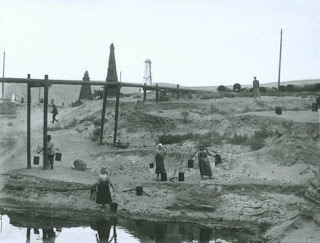A bit of backstory: the beginning of Akunin’s novel was
first published in Le Figaro, which
in 2008 solicited a series of stories celebrating Homer. Apparently all
the pieces Le Figaro published in the
series begin with that line, which also happens to begin the fourteenth book of
The Odyssey. Caveat: since I haven’t read
The Odyssey (ouch!), I’m not sure
what other elements Akunin may have borrowed. I can say that Akunin’s Odysseus
is, initially, in Yalta in 1914. So is Fandorin, on a Chekhov-related mission. Odysseus
commits murder and absconds to Baku meaning, of course, that Fandorin goes to
Azerbaijan, too, both to hunt down Odysseus and to deliver trunk of clothes to
his wife, the actress known as Klara Lunnaya, who’s making a film in Baku. Phew.
Well. Well. I’ve
long had a sentimental soft spot for Akunin’s Fandorin novels because it was the
unexpected gift of a Fandorin Book, Любовница смерти (known as She Lover of Death in Andrew
Bromfield’s translation), that got me reading contemporary Russian fiction a
decade or so ago. But, as I’ve
noted before, my interest in Akunin’s Fandorin series dropped off rather
sharply after He Lover of Death—the
ninth book in the Fandorin franchise: I wasn’t even able to finish all four
that came after that—and more than one Russian reader has suggested to me that
Akunin исписалcя, wrote himself out, after He Lover of Death.
 |
| Pipeline, Black City, 1905 |
Will the loony Klara and Fandorin (who clearly disdains her
and recognizes her use of her stage characters’ speeches in real life) stay
together despite her cinematic suitor? Will Fandorin and his local sidekick
Gasym, who mangles Russian grammar, catch the bad guys? Will the merry petroleum
widow whose eunuch servant serves as a fixer (and voyeur, too: I think this bit
player is one of the book’s most interesting characters) for her assignations
set her eye on Erast Petrovich and lure him to her home? And, since someone
somewhere referred to The Black City as
containing alternative history: will the world erupt in war after the events in
Sarajevo? I’ll never tell. All in all, I think I got more enjoyment from
surfing for background on turn-of-the-last-century Baku and looking
at old online photographs than reading The
Black City, which lacks pep and pop, and feels all too much like a franchise
novel.
Up Next: Eugene
Vodolazkin’s Aviator and Alexander
Snegirev’s Vera, both of which I’m
enjoying, in very different ways. The Big Book longlist is coming soon, too. Also:
translations due out in 2016. Translators and publishers, please let me know
what you have scheduled for release this year!
Photograph by Carl Bulla (who sounds like
a pretty interesting character himself!), via Wikipedia.



A major publisher has just bought worldwide English rights to Petrosyan's "In the House That"; I hope it'll be out this year, since the translation is already done.
ReplyDeleteThanks for the tip, Anonymous, I see on the Elkost website that Amazon Crossing bought world English rights.
Deletehttp://www.elkost.com/authors/petrosyan/books/1119-the-house-that
Oh. OK, it's just that Amazon people told me that the info was still confidential. I guess not anymore.
DeleteDear Lisa
ReplyDeleteI liked the Diamond Chariot, but I remember being surprised that it didn't seem follow on especially from the rest of the series.
Also, I thought Diamond Chariot was supposed to be the last in the series. I am shocked (mildly) that Akunin is still dribbling them out.
Ivan
Thank you for your comment, Ivan! I'll add a hearty "same here" to your mild surprise -- I, too, though the series was finished a long time ago.
Delete